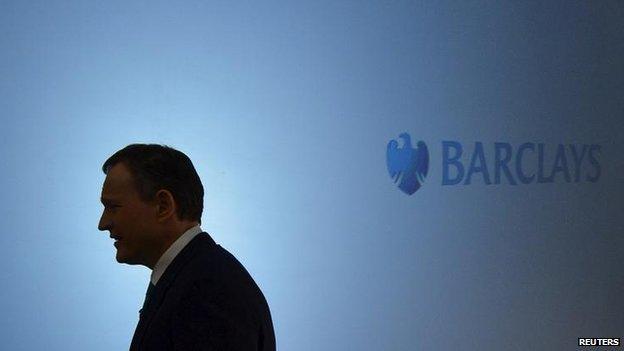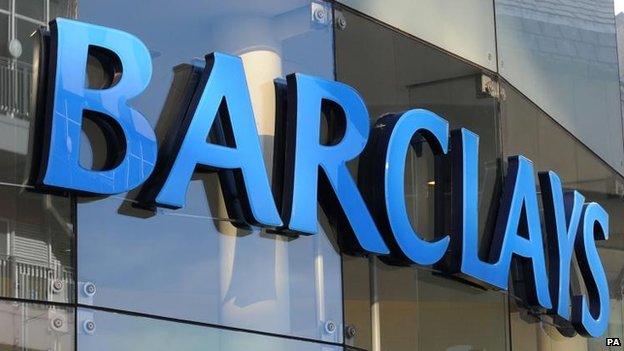Barclays chairman confirms he 'fired' Antony Jenkins - here's why
- Published
- comments

Mr Jenkins was seen as a "safe pair of hands" when he was appointed
In terms of power, there is now one man in charge of Barclays.
His name is John McFarlane, the man who took over as chairman of Barclays earlier this year and, from 17 July, will also be the bank's chief executive.
Mr McFarlane will ostensibly use his position to lead the hunt for a new chief executive following the defenestration of Antony Jenkins - also known as "The Saint".
But, make no mistake, Mr McFarlane will use his lofty position to take a long hard look at the structures at Barclays and see where he can cut costs and make the bank run more efficiently.
It was exactly what he did in his previous role as chairman of Aviva, where Andrew Moss, the chief executive, soon found himself surplus to requirements.
For Barclays, the gimlet eye of Mr McFarlane could mean more job losses and more branch closures.
"Yes, of course that is happening right across the industry and that's quite natural," he told me.
"Of course automation and use of mobile technology is bringing that to bear anyway.
"Inevitably over the medium term banks are going to have [fewer] branches than they have now because people are just not using them to the extent they used to. They are exponentially using other means."
And anyone sitting in what might be described as a "cumbersome" management role better watch out as well.
When I spoke to Mr McFarlane earlier this morning, he was clear where the problems lay.
"Barclays is not efficient, we are not productive, we are cumbersome," he told me.
"We have [a] very large bureaucracy and personal accountability is not as high as we need it to be.
"And so it's not just a reduction in costs, it's a change in the way we do things that's required here."
Different skills
Clearly, although Mr McFarlane insists the strategy remains the same for Barclays, there could be some major structural changes.
The board appears to have come to the conclusion that Mr Jenkins, the "safe pair of hands" after the trials and tribulations of the Bob Diamond era, was not the man for the next stage of Barclays' development.
"His skill set was suited to what we needed to get done and he did that superbly well," Mr McFarlane said of Mr Jenkins who settled the bank down, attempted to change the hard-ball culture and started reining in the investment bank during his three years in charge.
"He is a tremendously successful retail banker. That has been his strength and in the values creation.
"What we really need is profit improvement and returns improvement and that is a different skill."
I asked, pretty bluntly, if Mr Jenkins was fired.
"Yes, he was definitely asked to leave and it was a board decision, fully endorsed by me.
"I was approached by the senior independent director, who convened a session of the non-execs, who came to me and said 'I think we need new leadership and we need it quickly, would you prepared to step in?'.
"I considered it and endorsed thoroughly what had happened. There had been some rumbling over this for some weeks in the non-executive camp and so we brought it to a head and we made a decision."

'Pro investment banking'
I am told that Sir Mike Rake, the deputy chairman of Barclays, led the delegation which spoke to Mr McFarlane about their concerns.
Sir Mike has always been more positive than Mr Jenkins about the role of the investment bank in Barclays' future. He was, after all, a close colleague and friend of Mr Diamond who revamped the bank's investment arm.
I asked Mr McFarlane if the global investment bank would now grow.
"None of the investment banks are producing superior returns at the moment," he said.
"It's a very difficult marketplace, everyone is tightening their belts and so that is in parallel with us.
"When you look at where we are in investment banking - we're very strong in Europe and in North America and we have satellites elsewhere to feed that.
"So I would not use the word global, I would use the word international. We are very committed to that.
"We are pro investment banking.
"But having been through this over four decades, this area can be quite volatile, you don't want it to be an unusually large percentage of your profits.
"It needs to be balanced. We do want it to grow but we want the other parts of the organisation to grow faster so that proportionately it does not increase as a percentage of the total."
Barclays' era of safety first appears to be over. Expect a bank now rather more aggressive about looking for growth and cutting its own cloth.